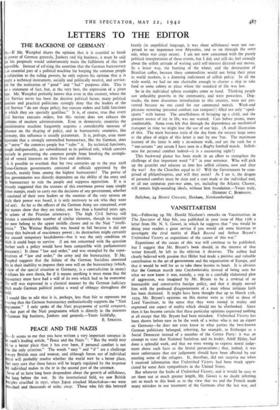PEACE AND THE NAZIS
,—It seems to me that you have written a very important sentqice in week's leading- article, " P.eace and the Nazis ": "But the world may be a better place than it has ever been, if personal comfort is not be the only criterion." The words " may " and " if " are a challenge every British man and woman, and although forces out of individual trol will probably resolve whether the world MAY be a better place, Feel very sure that these forces will be largely regulated by the response individual makes to the IF in the second part of the sentence.
Some of us have long been despondent about the growth of selfishness, long before the war. In the international field, we saw British cples crucified in 1931, when japan attacked Manchukuo—we were touched and thousands of miles away. Those who felt this betrayal keenly (in unpolitical language, it was sheer selfishness) were not sur- prised to see impotence over Abyssinia, and so on through the sorry tale, when war crept nearer. I am not now concerned -with the purely political interpretation of these events, but I did, and still do, feel strongly about the selfish attitude of waiting until self-interest dictated our moves. In a lesser way, the burning of the wheat, and the destruction of Brazilian coffee, because these commodities would not bring their price in world markets, is a damning indictment of selfish policy. In all the wide world, we had no one charitable enough to charter a ship to take food to some colony or place where the standard of life was low.
So in the individual sphere examples come to hand. Thinking people saw unhealthy growths in the community, and were powerless. Dog- tracks, the most disastrous introduction to this country, were not pre- vented because no one cared for our communal morals. Week-end pleasure motoring (personal comfort run rampant!) filled not only " spoil- sports " with horror. The unselfishness of bringing up a child, and the greatest source of joy in life, was not wanted. Cars before prams, more comfortable. Some even felt that through the dependence on mechanical transport in time we might lose the- use of our legs. (A small illustration of this. The main business train of the day from the nearest large town to the place of origin of this letter is met by one 'bus. The maximum journey of the latter is only a zo-minute walk, and yet the rush for it " out-scrums " any scrum I have seen in a Rugby football match. Selfish- ness for personal comfort indeed—it is a nauseating sight!) This backward glance has been made in an effort to strengthen the challenge of that important word " if " in your sentence. Who will pick up the gauntlet and educate us into less selfish citizens, now and after the war? Are the Churches equal to it? Will the Government be com- prised of philanthropists, and will they assist? As I see it, the dragon of personal comfort must be slain and a start made at the individual end, or all our corporate post-war aims, yes, including the Atlantic Charter, will remain high-sounding ideals, without firm foundation.—Yours truly,
• HERBERT C. ROBINSON.
Ballyhue, z Hextol Crescent, Hexham, Northumberland.






















 Previous page
Previous page